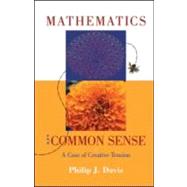
Note: Supplemental materials are not guaranteed with Rental or Used book purchases.
Purchase Benefits
| Preface | vii | ||||
| Acknowledgments | xi | ||||
| Letters to Christina: Answers to Frequently Asked Questions | xvii | ||||
| Letters to Christina: Second Round | xxxi | ||||
|
1 | ||||
|
9 | ||||
|
21 | ||||
|
29 | ||||
|
37 | ||||
|
47 | ||||
|
51 | ||||
|
61 | ||||
|
67 | ||||
| 10 Category Dilemmas | 71 | ||||
| 11 Deductive Mathematics | 75 | ||||
| 12 Mathematics Brings Forth Entities Whose Existence Is Counterintuitive | 81 | ||||
| 13 "In Principle We Can...": Mathematical Existentialism | 91 | ||||
| 14 Mathematical Proof and Its Discontents | 95 | ||||
| 15 The Logic of Mathematics Can Spawn Monsters | 99 | ||||
| 16 Rules and Their Exceptions | 103 | ||||
| 17 If Mathematics Says "No" Does It Really Mean It? | 107 | ||||
| 18 Inconsistencies and Their Virtues | 117 | ||||
| 19 On Ambiguity in Mathematics | 125 | ||||
| 20 Mathematical Evidence: Why Do I Believe a Theorem? | 129 | ||||
| 21 Simplicity, Complexity, Beauty | 141 | ||||
| 22 The Decline and Resurgence of the Visual in Mathematics | 147 | ||||
| 23 When Is a Problem Solved? | 163 | ||||
| 24 What Is Meant by the Word "Random"? | 179 | ||||
| 25 The Paradox of "Hitting It Big" | 185 | ||||
| 26 Probability and Common Sense: A Second Look | 191 | ||||
| 27 Astrology as Early Applied Mathematics | 195 | ||||
| 28 Mumbo Math | 201 | ||||
| 29 Math Mixes It Up with Baseball | 207 | ||||
| 30 Mickey Flies the Stealth: Mathematics, War, and Entertainment | 211 | ||||
| 31 The Media and Mathematics Look at Each Other | 219 | ||||
| 32 Platonism vs. Social Constructivism | 231 | ||||
| 33 Mathematics at the Razor's Edge | 237 |
The New copy of this book will include any supplemental materials advertised. Please check the title of the book to determine if it should include any access cards, study guides, lab manuals, CDs, etc.
The Used, Rental and eBook copies of this book are not guaranteed to include any supplemental materials. Typically, only the book itself is included. This is true even if the title states it includes any access cards, study guides, lab manuals, CDs, etc.